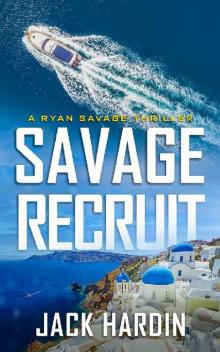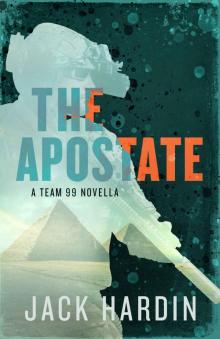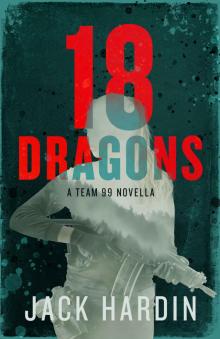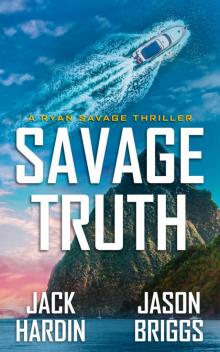- Home
- Jack Hardin
Lonely Coast
Lonely Coast Read online
Lonely Coast
An Ellie O’Conner Novel | Book 6
Jack Hardin
First Published in the United States by The Salty Mangrove Press
Copyright © 2019 by Jack Hardin. All rights reserved.
This is a work of fiction. Names, characters, businesses, places, events, locales, and incidents are either the products of the author’s imagination or used in a fictitious manner. Any resemblance to actual persons, living or dead, or actual events is purely coincidental.
No part of this book may be reproduced in any form or by any electronic or mechanical means, including information storage and retrieval systems, without written permission from the author, except for the use of brief quotations in a book review.
Contents
Chapter 1
Chapter 2
Chapter 3
Chapter 4
Chapter 5
Chapter 6
Chapter 7
Chapter 8
Chapter 9
Chapter 10
Chapter 11
Chapter 12
Chapter 13
Chapter 14
Chapter 15
Chapter 16
Chapter 17
Chapter 18
Chapter 19
Chapter 20
Chapter 21
Chapter 22
Chapter 23
Chapter 24
Chapter 25
Chapter 26
Chapter 27
Chapter 28
Chapter 29
Chapter 30
Chapter 31
Chapter 32
Chapter 33
Chapter 34
Chapter 35
Chapter 36
Chapter 37
Chapter 38
Chapter 39
Epilogue
Author’s Note
Chapter One
Ellie O’Conner steadied her breathing as she limped toward the corner of the wooden structure. The back of her calf screamed from where she’d been shot. She ignored it and checked the load on her weapon. Only three rounds left. She swallowed hard against a parched throat. It had been years since she’d been in a situation where she wondered if she would make it out alive. Her heart was racing, and as another round whizzed by her ear, she ducked further into cover. She turned to see where the shot originated and, seeing a shadow of movement, pressed the trigger.
Nothing happened. She tried again. Her gun was jammed.
Tyler Borland suddenly appeared in front of her, his weapon leveled at her chest.
She cursed her gun while keeping a defiant glare on him. “I never should have trusted you,” she growled.
“No,” he said blandly. “You shouldn’t have.”
“I loved you.”
His lips formed a hard, mocking grin. “Your mistake.”
“Don’t do this, Tyler.”
He huffed. “You’ve left me no choice. What did you expect? I told you it would end this way.” And without another word, he pressed the trigger. Ellie grunted as her chest took the full impact of the round and red blossomed across her shirt. She fell to the ground and howled with pain as she rubbed at her chest.
“You’re not supposed to shoot people when you’re that close!” she barked.
Tyler lowered his paintball gun and removed his protective face mask as he crouched beside her.
“Sorry. You okay?”
She flipped her own mask off. “Sure. But now I’ll be wearing a nasty bruise for the next week.”
“I should have aimed for your kneecaps.”
She held out her hand. “Help me up.” He helped her to her feet and leaned in for a conciliatory kiss. “Nuh-uh. I’m going to need a minute to stop hating you.”
“Why? Because I shot you so close or because I beat you?”
“Both.”
“Fair enough.”
An air horn disturbed the stillness, signaling the end of the round, and eight other players across the wooded course lowered their guns and slowly made their way toward the front.
“You know,” Tyler said, “for being an ex-black ops soldier, you sure are pretty rusty.”
“You know,” Ellie retorted, “for being a tall, handsome man, you sure are pretty good at saying stupid stuff.”
“Touché, my lady. Touché.”
“Are you ready, sweetie? We’re already running late. We’ve got to go.” Tricia Leeland shouldered her purse and looked around for her keys.
“Almost, Mommy.” Seven-year-old Mason ran the comb across the top of his wet hair and patted it lightly with his hand. He called to her from the bathroom of their small apartment. “Can’t I just stay here?”
She appeared in the doorway looking frazzled. “No. I don’t know how long it’s going to take. The lines at these places can be out the door sometimes.” Mason set the comb down on the edge of the sink and walked out of the bathroom. “Don’t forget your backpack,” she said. “You need to get your homework done while we wait.”
“Okay. Can I bring my DS?”
She hesitated. “Okay. But no playing it until after you finish all your homework.”
The boy smiled and bounced into his room to retrieve his portable game console. He reappeared seconds later. “Ready!”
Tricia engaged a tired smile, the kind intended to hide her exhaustion from her son, the kind that came from raising a child alone and working two, and sometimes three jobs to keep the bills paid. But even working thirteen hours a day wasn’t cutting it any longer. The wolves were at the door: the electricity was due to get shut off tomorrow, her cell phone the day after that. Friday paychecks were still three days away. There were just too many holes in the bucket. There was just no way to catch up.
Tricia opened the apartment door and waited for Mason to step into the stairwell before shutting and locking the door behind her. She glanced at her phone, noting the time. “Come on,” she said urgently. “We’re going to be late for the bus. If we miss it, I won’t make my appointment.” They rushed down the stairs and out of the open-air stairwell, hurrying down the cracked sidewalk as they followed it to the bus stop. Mason’s backpack bounced along his shoulders as he struggled to keep up with his anxious mother. A loud clatter behind him forced him to look back. His DS was lying upside down on the cracked concrete.
“Mommy, hold on!” he yelled and grabbed up his electronic toy. He flipped it over. “Oh, man, it’s all scratched up!” The next thing he knew, his mother was grabbing tightly onto his hand and pulling him along.
“How many times have I told you to zip up the pockets on your backpack?” she said. Then she added, “I’m sorry it got scratched up.” Ahead, on the corner, the protesting squeal of heavy brakes filled the air as their bus pulled into view and idled against the curb. “Hurry!” Tricia quickened her pace as she watched the bus’s door slide shut and heard the hiss of the brakes as the driver reengaged the transmission. Still pulling her little boy behind her, Tricia reached the curb and slapped at the door with an open palm just as the bus was pulling away.
The driver shot her a quick glance, slammed on the brakes, and engaged the lever that opened the door. “Thank you! I’m sorry to have you stop,” Tricia said.
The driver’s nameplate indicated that his name was Ray, and after quickly assessing the frazzled mother and her little boy, he offered a knowing smile. “Now don’t you go apologizing to me. Me and my wife raised four little ones and now we’re watching them raise their little ones. It’s not an easy job.”
Tricia fumbled three dollars out of her wallet and reached for the slot on the payment apparatus. Ray took his hand off the steering wheel and covered the slot, then winked at her. “Moms ride free today.”
She smiled at the older man, grateful for
his kindness. “Thank you.”
“Now,” Ray said, “you two go find a couple seats and we’ll get this show on the road.” He shut the doors and turned his attention back to the congested traffic hurtling by.
Mason looked toward the back of the bus. “Mommy, can we ride at the back? I love riding at the back!”
“Sure, sweetie. Lead the way.”
Mason bounded past a handful of passengers before arriving at the row in the back. He slid in all the way to the window and looked out as the bus reentered traffic.
Over the next fifteen minutes, the bus paused at seven different stops along the route while Tricia continued to steal nervous glances at her phone. Her appointment at the Florida Department of Children and Families was set for four-thirty. If she missed this one, she had been informed that they wouldn’t be able to reschedule her for another five or six weeks.
She needed the food money assistance.
Right now, all they had in the kitchen was a half gallon of milk, a box of Cheerios, some oatmeal, and a scattering of chips and bread.
Mason wiggled in his seat as the bus came to yet another stop and someone got off. “Mommy, can I go talk to the driver? I’m bored.”
“Why don’t you get your homework out and start that?”
“I get sick when I read in a car. Or a bus,” he added, giggling.
By pure habit, Tricia found herself starting to say no before reconsidering. “Sure, sweetie. But hold on to the rails and don’t talk to him while he’s driving.”
He shot excitedly to his feet and slipped past her. “Okay!”
Tricia watched Mason make his way up the aisle and then looked at the time again. She started to pick nervously at her thumbs. She only had eight minutes until her appointment, and they were still three stops away.
Up at the front, Mason had a firm grip on the safety rail while he watched Ray maneuver the bus across the city. Ray glanced up at the large rearview mirror that gave him a fisheye view of all his passengers. “What do you think, young man?”
“That’s a big steering wheel,” Mason said.
“Sure is. It has to be.”
Mason remembered his mother telling him not to speak while the bus was moving, so he just looked happily around, taking in the payment kiosk, the large windows, and the steps near the door. A large nylon bag was sitting alone on the front seat, right beside him. “Hey, mister driver. I think someone maybe left their bag on accident.”
Ray looked up and examined the bag’s reflection in the mirror. He frowned, “Hmm, well that happens sometimes. More than you might think, actually. I’ll take a quick look at it when we get to the next stop.”
A minute later the bus slowed, and Ray brought it to a full stop before opening the doors and standing up. From her place in the back, Tricia watched as Ray slid out from behind the wheel. Mason moved out of the way as the older man stepped around him and unzipped the nylon bag. Mason looked over at his mother and smiled proudly. As Tricia waved at him, she felt something rattle near her feet. She looked down and saw Mason’s DS. It had fallen out of his backpack again; he still hadn’t zipped up the pocket. She sighed defeatedly and leaned down to grab it just as the canvas bag her boy was standing beside exploded into a deafening fireball and a subsonic blast of C-4 sent hundreds of nails and ball bearings hurtling outward at blinding speeds.
Half a block down the street, a Chrysler Sebring was parallel parked along a curb, engine idling. The driver watched through his windshield as a cloud of light gray smoke billowed up from the nest of twisted metal that moments ago had been the front of the bus. Everywhere people were screaming and crying, frantically running—or in some cases, hobbling—away from the direction of the explosion.
The driver of the Sebring smiled broadly, as though he had just witnessed a rainbow emerge at the other end of a sun shower. He slid the transmission into drive and pulled away from the curb, navigating around a delivery truck that had stopped in the middle of the street. The truck’s operator had left his door open and was moving toward the blast site in an apparent effort to be a local hero.
The driver turned the Sebring onto N. Franklin Street and moved slowly past a row of cars parked along the curb. A handful of car alarms were blaring as if sounding a warning that had come too late. He stopped obediently at a red light and watched as cautious pedestrians moved timidly toward the blast site, which was now hidden by a massive skyscraper.
He thought about where to get an early dinner. There was a corner cafe in Uptown, and he thought he might go there and allow himself a celebratory meal. Breakfast for dinner; that always hit the spot, didn’t it? The traffic light switched to green, and he slowly accelerated as his fingers tapped the steering wheel and he hummed happily to himself the chorus from Simon and Garfunkel's “The Boxer.”
Lie la lie, lie la la la la lie la la lie…
Chapter Two
Ellie twisted the towel around her head and flung it back before leaning over the sink and rubbing a corner of it against the foggy mirror. She inspected the welt on her chest from where Tyler had shot her with the paintball, and her thoughts hastened toward plotting her revenge. An area of skin the size of a half dollar was an unsightly blend of red and purple and sensitive to the touch. She opened the bathroom door, and the air conditioning cooled skin that was still warm from the hot shower.
A couple of minutes later, she emerged from her bedroom wearing old shorts and a tattered Jim Morrison T-shirt that had been marred by far too many painting projects. White, red, pink, and dark green brush strokes, along with tiny drops of paint, graffitied the old shirt. It had belonged to Ellie’s father for decades; he had used it for household projects for as long as she could remember. The pink paint was from her childhood bedroom, the green from the exterior trim on the house, and the red from a bookcase Frank O’Conner had made for Ellie’s younger sister, Katie. Ellie still had an unsettling suspicion that it might be some form of blasphemy to treat a Jim Morrison T-shirt this way, but she hadn't been the one to deface it initially, and the fact that her father had spent so many hours in it overrode just about any other concern.
She walked across the small house and opened the door to her garage. Heat hit her face like she had just pulled back the oven door, and she punched the garage door opener on the wall. The door rattled up, and she walked around her blue El Camino to a set of metal shelves. She gathered up her paint supplies and a can of gray paint she had purchased yesterday, then went back into the house and unloaded everything onto the kitchen table.
She looked through her sliding glass door and saw her Jack Russell terrier, Citrus, sitting on the railroad tie that formed the top edge of the seawall. He was staring off into the water, a forlorn look on his usually eager face. Even his little shoulders were slumped. He looked every bit a case study for Xanax.
When Ellie had moved back to Pine Island a year ago, she had bought this house, and one of the first things she did was build Citrus a narrow ramp along the seawall leading down into the water. Some days he would spend hours jumping off the seawall and scurrying up the ramp. When he was finally done, he would scratch on the back door, and Ellie would get the hose and rinse the saltwater off of him. Then he would find a patch of shady grass to fall asleep in.
But Citrus, who loved the water possibly more than he loved Ellie, had recently had his little doggy world turned upside down by the unexpected arrival of an unforeseen nemesis, a gray tabby cat who had moved into the house directly across the canal.
The first time the “event” happened, Ellie had just gotten home from work, let Citrus outside, and barely had the refrigerator door open when she heard someone being executed in the canal. Racing outside, she could barely make out her dog among all the wet fur and water and foam. Dog and cat were going at it, the angry dog barking and screaming, the cat screeching and hissing. The cat finally got the upper hand, somehow finding a stable perch on top of the dog’s head, where she dipped back and forth like a buoy on the open water as the d
og writhed beneath her. Ellie had been ready to jump in when Citrus finally struggled away from the cat and paddled hurriedly back to his ramp. He arrived in the backyard hacking and coughing. Ellie thought maybe he had inhaled a fish. The cat swam back to its own side and easily made it up the seawall.
Ever since, whenever Citrus jumped into the water, the cat was hardly a second behind, launching itself from the other side and landing on the dog with all the precision of a laser-guided missile.
The last event was three days ago. Citrus had arrived back at the top of his ramp confused and defeated. Now, he sat staring wistfully at the water, remembering better days before the terrorist moved into the neighborhood.
The cat sat calmly in the shade beneath a banana tree, chin up, tail flitting every so often, waiting like a rancorous guard for the dog across the canal to try to brave a trip into the water again.
Ellie had walked around to the other street to the house where the cat lived. No one had answered when she knocked on the door, and three more attempts yielded the same result. The last time, she had left a note on their front door with her phone number. That was days ago now, and she had yet to receive a call.
Tyler had offered to send the cat to “Kitty Hell” with help from his .22.
“How do you know it’s going to hell?” she’d asked.
“Because all cats go to hell. Everyone and their dog knows that,” and that got an immediate and affirming yip from Citrus.

 Savage Recruit (Ryan Savage Thriller Series Book 8)
Savage Recruit (Ryan Savage Thriller Series Book 8) Bitter Tide
Bitter Tide Vacant Shore
Vacant Shore Breakwater
Breakwater The Apostate
The Apostate 18 Dragons
18 Dragons Lonely Coast
Lonely Coast Savage Truth
Savage Truth Broken Stern_An Ellie O'Conner Novel
Broken Stern_An Ellie O'Conner Novel Broken Stern: An Ellie O'Conner Novel (Pine Island Coast Florida Suspense Series) Book 1
Broken Stern: An Ellie O'Conner Novel (Pine Island Coast Florida Suspense Series) Book 1